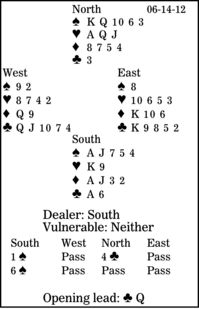Bridge column, June 14: To cash early or to cash late?

When you are teaching, it is good to repeat the key points because many students do not learn well by listening. In a newspaper column, once ought to be sufficient for two reasons: Most people learn much better by reading, and it can easily be reread.
In this deal, though, the problem is to avoid two diamond losers. How should South play in six spades after West leads the club queen?
North's four-club response was a splinter bid, showing four or more spades, the values for at least game, and a singleton (or void) in clubs. South bid what he thought he could make.
The right approach is to eliminate hearts and clubs, then to play the ace and another diamond, hoping an opponent has king- or queen-doubleton. Then he will be endplayed, forced to concede a ruff-and-sluff. But just in case East has the doubleton, South should cash his diamond ace early; maybe it won't occur to East to throw his honor under the ace. Later, the endplay will be more obvious.
Here is South's best line: Win with the club ace, cash the diamond ace, ruff the second club on the board, draw trumps, and run the hearts, discarding a diamond from hand. Then play another diamond.
As you can see, after West wins with his queen and returns a heart or a club, declarer ruffs on the board and sluffs his last diamond.
** ** **
COPYRIGHT: 2012, UNITED FEATURE SYNDICATE
DISTRIBUTED BY UNIVERSAL UCLICK FOR UFS

